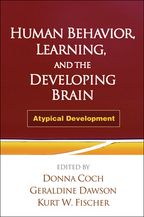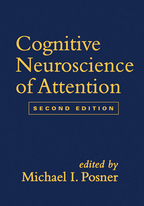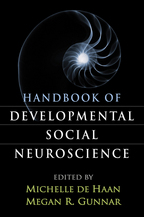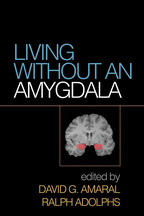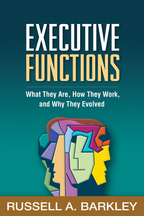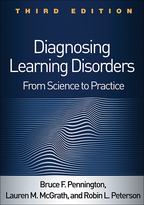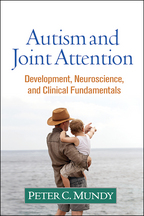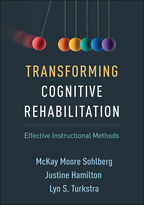Human Behavior, Learning, and the Developing Brain
Atypical Development
Edited by Donna Coch, Geraldine Dawson, and Kurt W. Fischer
HardcoverPaperbacke-bookprint + e-book
Hardcover
orderFebruary 1, 2007
ISBN 9781593851378
Price: $83.00 378 Pages
Size: 6⅛" x 9¼"
Paperback
orderJune 15, 2010
ISBN 9781606239667
Price: $55.00378 Pages
Size: 6⅛" x 9¼"
“A fascinating introduction to the rapidly developing field of developmental cognitive neuroscience and its implications for advancing our understanding of developmental psychopathology. It should be particularly valuable in orienting graduate students to exciting new possibilities for increasing understanding and remediation of debilitating disabilities that have eluded researchers' efforts to solve the mysteries that limit the quality of life of untold numbers of children and adults.”

—PsycCRITIQUES
“This book provides a useful description of research describing brain-behavior relationships in individuals with certain specific developmental disorders.”

—Journal of the Canadian Academy of Child and Adolescent Psychiatry
“Provides a sophisticated review of current knowledge regarding particular syndromes and does so through a variety of experimental and clinical perspectives.”

—Doody's Review Service
“In this valuable collection, leading scientists present the latest findings about the biological bases of developmental disorders, including dyslexia, autism, and attentional deficits. The book also includes early markers for these disorders, as well as appropriate educational interventions.”

—Howard Gardner, PhD, Harvard Graduate School of Education
“The exciting interdisciplinary venture of clinical developmental cognitive neuroscience has come of age with this volume. More and more students from the behavioral sciences are eager to learn how brain, cognition, and behavior are linked. In this book, they will find that the atypically developing brain tells us more about human learning and human behavior than the typically developing brain ever reveals. But atypical development, as seen in autism, dyslexia, dyscalculia, or Williams syndrome, is also fascinating in its own right. The stellar array of authors represented in this volume guarantees that the reader will be provided with state-of-the-art information about neurodevelopmental disorders. No undergraduate or graduate course on the topic can do without this book.”

—Uta Frith, PhD, Institute of Cognitive Neuroscience and Department of Psychology, University College London
“Contributors in this important volume utilize multiple levels of analysis in order to more fully explicate the interplay between typical and atypical developmental processes. In synthesizing the fields of cognitive and affective neuroscience and developmental psychopathology, the book presents novel conceptual and methodological tools for studying adaptive, maladaptive, and resilient developmental outcomes. This book is an essential addition to the libraries of neuroscientists, developmental psychopathologists, and graduate students in related disciplines.”

—Dante Cicchetti, PhD, Institute of Child Development and Department of Psychiatry, University of Minnesota
“These twin volumes beautifully document how much recent progress there has been in the new field of developmental cognitive neuroscience. Presenting a very clear exposition of the close links between typical and atypical development at multiple levels of analysis, the books will be of value to anyone who studies human development or applies developmental knowledge.”

—Bruce F. Pennington, PhD, Distinguished University Professor of Psychology, University of Denver
“It is exceedingly difficult to keep up with the rapidly changing area of human cognitive development, learning, and the brain. Now, in this pair of volumes, leading contributors summarize our current understanding of normal and atypical development across the cognitive and emotional spectrum. These volumes will sit near many desks, including mine.”

—Howard Gardner, PhD, Harvard Graduate School of Education
—PsycCRITIQUES
“This book provides a useful description of research describing brain-behavior relationships in individuals with certain specific developmental disorders.”
—Journal of the Canadian Academy of Child and Adolescent Psychiatry
“Provides a sophisticated review of current knowledge regarding particular syndromes and does so through a variety of experimental and clinical perspectives.”
—Doody's Review Service
“In this valuable collection, leading scientists present the latest findings about the biological bases of developmental disorders, including dyslexia, autism, and attentional deficits. The book also includes early markers for these disorders, as well as appropriate educational interventions.”
—Howard Gardner, PhD, Harvard Graduate School of Education
“The exciting interdisciplinary venture of clinical developmental cognitive neuroscience has come of age with this volume. More and more students from the behavioral sciences are eager to learn how brain, cognition, and behavior are linked. In this book, they will find that the atypically developing brain tells us more about human learning and human behavior than the typically developing brain ever reveals. But atypical development, as seen in autism, dyslexia, dyscalculia, or Williams syndrome, is also fascinating in its own right. The stellar array of authors represented in this volume guarantees that the reader will be provided with state-of-the-art information about neurodevelopmental disorders. No undergraduate or graduate course on the topic can do without this book.”
—Uta Frith, PhD, Institute of Cognitive Neuroscience and Department of Psychology, University College London
“Contributors in this important volume utilize multiple levels of analysis in order to more fully explicate the interplay between typical and atypical developmental processes. In synthesizing the fields of cognitive and affective neuroscience and developmental psychopathology, the book presents novel conceptual and methodological tools for studying adaptive, maladaptive, and resilient developmental outcomes. This book is an essential addition to the libraries of neuroscientists, developmental psychopathologists, and graduate students in related disciplines.”
—Dante Cicchetti, PhD, Institute of Child Development and Department of Psychiatry, University of Minnesota
“These twin volumes beautifully document how much recent progress there has been in the new field of developmental cognitive neuroscience. Presenting a very clear exposition of the close links between typical and atypical development at multiple levels of analysis, the books will be of value to anyone who studies human development or applies developmental knowledge.”
—Bruce F. Pennington, PhD, Distinguished University Professor of Psychology, University of Denver
“It is exceedingly difficult to keep up with the rapidly changing area of human cognitive development, learning, and the brain. Now, in this pair of volumes, leading contributors summarize our current understanding of normal and atypical development across the cognitive and emotional spectrum. These volumes will sit near many desks, including mine.”
—Howard Gardner, PhD, Harvard Graduate School of Education

